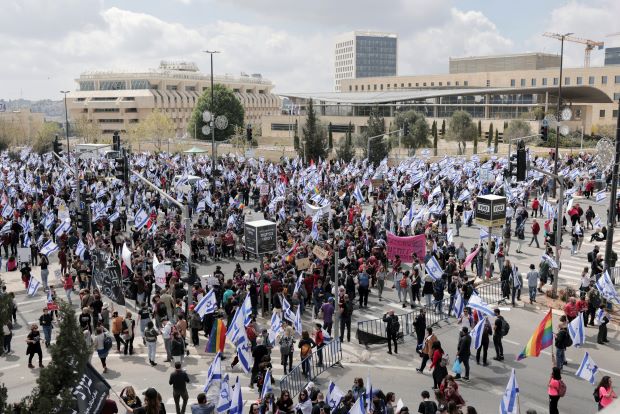After unrest, Netanyahu delays his plan to weaken Israel’s judiciary

By Patrick Kingsley
JERUSALEM — Prime Minister Benjamin Netanyahu of Israel announced Monday (27) that he was delaying his government’s contentious plans to overhaul the judiciary, setting the stage for a possible easing of one of the deepest domestic crises in the country’s history.
Speaking on national television, Netanyahu said that he would delay final voting in Parliament on the legislation that would allow the government to assert greater control over the Supreme Court, a plan that has sparked weeks of nationwide protests.
“When there is a possibility of preventing a civil war through dialogue, I, as the Prime Minister, take a time out for dialogue,” Netanyahu said.
The announcement came after a hard-line member of his coalition, Itamar Ben-Gvir, said he was open to delaying a vote on the government’s plans. And it came a day after Netanyahu fired his defence minister, Yoav Gallant, who had called for a halt to the process, raising doubts about the stability of the government.
Netanyahu’s decision to postpone the judicial overhaul followed a night of turmoil across Israel, with raucous street demonstrations erupting Sunday (26) night after he dismissed Gallant. Israel’s major universities shuttered their classrooms Monday morning in protest, while strikes rippled across the country.
Ben-Gvir, the head of the Jewish Power party in Netanyahu’s governing coalition, said Monday that he had agreed with the prime minister that the plans to overhaul the judiciary could be delayed until after a coming parliamentary recess, removing what had been viewed as the biggest obstacle to any postponement.
But Ben-Gvir made it clear that he was not backing down.
“The reform will pass,” he said on Twitter.
He added: “The National Guard will be established. The budget I demanded for the Ministry of National Security will be passed in its entirety. No one will scare us.” Ben-Gvir was referring to a promise he said he had secured from Netanyahu to establish a national guard that will operate alongside police and under his authority.
The government had sought to push through legislation that would give it greater control over a committee that appoints new judges. It would also let Parliament override Supreme Court decisions and restrict the court’s ability to block laws passed by Parliament.
The measure has ignited bitter debate, setting off months of mass protests and prompting business leaders to begin divesting from Israel. It has also caused unease among soldiers and provoked rising criticism from influential Jewish Americans and the Biden administration.
Netanyahu is currently standing trial on charges of corruption, and opponents feared that his plans might make it easier for him to push through legislation in the future that could allow him to avoid any punishment. Netanyahu has repeatedly denied that getting himself off the hook is one of the aims of the judicial overhaul.
In recent days, Netanyahu had repeatedly vowed to press on with the plan — pledging to proceed with a vote in parliament early this week that would give the government a majority on the judicial appointments committee, which also selects Supreme Court justices.
But Netanyahu suddenly reversed his position Monday after a sharp rise in unrest overnight, the decision by universities to shut down for the foreseeable future, and strikes by trade unionists and Israeli embassy and consular staff abroad.
That added to a groundswell of opposition from another influential group within Israeli society: the military reserve.
Thousands of reservists, who play a key role in certain missions, including in the air force, had either threatened to refuse service if the overhaul went ahead or had already stood down. The chief of military staff, Lt. Gen. Herzi Halevi, recently warned government leaders that so many reservists were skipping duty that the military was close to reducing the scope of certain operations.
Netanyahu’s announcement raised hopes for a calming of the toxic and emotional national discourse on the judicial overhaul that many had feared could lead to political violence or even civil war. The government’s supporters and opponents had accused each other of attempting a coup, amid fears on both sides that the future of Israel’s democracy was at stake.
The overhaul has become a proxy for much deeper social disagreements within Israeli society related to the relationship between religion and state, the future of Israeli settlements in the occupied West Bank, and ethnic tensions among Israeli Jews.
Orthodox Jews and settlers say that the court has historically acted against their interests and that it has for too long been dominated by secular judges. Jews of Middle Eastern descent also feel underrepresented on the court, which has mostly been staffed by judges from European backgrounds.
The government’s supporters have contended that Israel cannot be a true democracy without giving elected lawmakers primacy over unelected judges. Critics of the government argue that the removal of judicial oversight of parliament would pave the way for authoritarian rule by a majority that would restrict minority rights.
-New York Times


Comments are closed, but trackbacks and pingbacks are open.